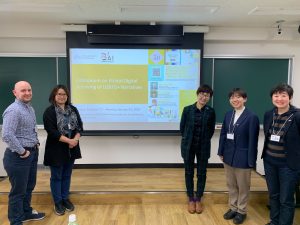2024.Mar.26
REPORTSReport on Colloquium on Ethical Digital Archiving of LGBTQ+ Narratives
Kyoko Takeuchi (Project Assistant Professor of the B’AI Global Forum)
・Date: Sunday, February 11 ~ Monday, February 12, 2024
・Venue: Room 327, Faculty of Science Bldg.3, Asano Campus, The University of Tokyo
・Language: English
・Organizer: B’AI Global Forum, Institute for AI and Beyond, The University of Tokyo
(Click here for details on the event)
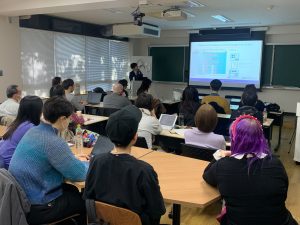
The Digital Archiving and Ethics of LGBTQ+ Narratives Study Group was held on February 11-12, 2024. The study group aimed to examine the possibilities and challenges related to digitally archiving LGBTQ+ narratives from multiple perspectives in relation to ethics, methods, and media technologies through lectures by three speakers and general discussion.
In a situation where reliable information on sexual minorities is scarce, it is important for people to be able to trace the activities and individual histories of sexual minorities in the past. There are various digital archives abroad, such as the ACT UP Oral History Project and the New York City Trans Oral History Project. In Asia, however, despite the growing interest in digital archives of various publications, broadcast programs, and cultural assets, digital archives of sexual minorities are currently limited, and it is necessary to examine what possibilities and challenges exist.
Furthermore, it is important to explore the impact of AI technology as a platform to enable such digital archives; AI technology is used to automatically extract, classify, and catalog the content of materials based on images and text, and is increasingly used in web archives. In this context, this workshop was held to discuss with researchers from different fields the issues that have arisen or may arise in the digital archiving and use of AI technology for sexual minority narratives in magazines, web texts, and interviews, and the ethical considerations that need to be considered.
Two scholars from overseas have been invited to this workshop. One is Dr. Avery Dame-Griff (Gonzaga University), an American researcher who has been involved in the creation of digital archives such as the Queer Digital History Project, and the other is Dr. Michelle Ho(National University of Singapore), who has conducted research on transgender people in Asia, particularly Japan. In addition, Kyoko Takeuchi, the organizer of the project, gave a lecture to explain the current state of social movements and archiving in Japan to date, and also led a field trip to visit archives.
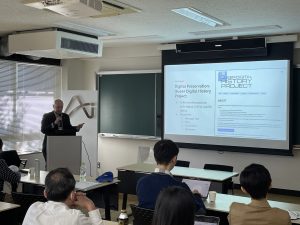 On the first day, Dr. Dame-Griff gave a presentation titled “Logging Queer Pasts: The Challenges of Documenting Early LGBTQ Digital Spaces,” based on his book The Two Revolutions: A History of the Transgender Internet (2023, NYU Press) and the Queer Digital History Project.” In this talk, he focused on the early LGBTQ Net, explaining in particular the difficulties of archiving, design, and privacy of archived material on Usenet. He then reported on the challenges of large-scale AI-based archiving efforts such as the Web Archive, which prioritize the collection of large amounts of data and leave ethical issues on the back burner, and raised the need for community-based discussions.
On the first day, Dr. Dame-Griff gave a presentation titled “Logging Queer Pasts: The Challenges of Documenting Early LGBTQ Digital Spaces,” based on his book The Two Revolutions: A History of the Transgender Internet (2023, NYU Press) and the Queer Digital History Project.” In this talk, he focused on the early LGBTQ Net, explaining in particular the difficulties of archiving, design, and privacy of archived material on Usenet. He then reported on the challenges of large-scale AI-based archiving efforts such as the Web Archive, which prioritize the collection of large amounts of data and leave ethical issues on the back burner, and raised the need for community-based discussions.
The second day of the conference focused on LGBTQ+ archiving in Asia. Takeuchi’s presentation was titled “Overview of Japanese LGBTQ+ Archiving Projects and Ethical Concerns.” The presentation provided an overview of the history of gay, lesbian, and transgender social movements in Japan. It then showed that LGBTQ (digital) archives have been/are being formed categorically, reflecting the accumulation of community-based movements. At the same time, the presentation also reported on the challenge of how to archive within a framework of intersectional experiences that have moved through various venues that fall outside of these categories and are incompatible with AI. After the presentation, the question of how to archive intersectional experiences was raised, and a researcher in the audience who had actually been involved in the archiving process shared the limitations of ethical review at universities.
The following presentation by Dr. Ho, “Asian Trans Archives: Some 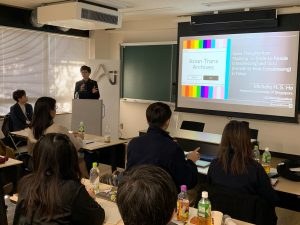 Thoughts from Studying Josō (Male-to-Female Crossdressing) and Dansō (Female-to-Male Crossdressing) in Tokyo,” examined what it means to be an Asian trans archive, based on her research on crossdressers in Tokyo. Particular focus was placed on how individual Asian FtM (Female to Male) share their identities and gender transition stories on YouTube. What is presented here is the possibility of archiving the individual’s everyday life that falls away from traditional “Western” state archiving and “proper” archiving practices that focus on community-based activities. During the Q&A session, it was concluded that it is necessary to examine the limitations of using commercial and capitalistic platforms, and what kind of practices individuals are doing on the platforms that are currently widely used.
Thoughts from Studying Josō (Male-to-Female Crossdressing) and Dansō (Female-to-Male Crossdressing) in Tokyo,” examined what it means to be an Asian trans archive, based on her research on crossdressers in Tokyo. Particular focus was placed on how individual Asian FtM (Female to Male) share their identities and gender transition stories on YouTube. What is presented here is the possibility of archiving the individual’s everyday life that falls away from traditional “Western” state archiving and “proper” archiving practices that focus on community-based activities. During the Q&A session, it was concluded that it is necessary to examine the limitations of using commercial and capitalistic platforms, and what kind of practices individuals are doing on the platforms that are currently widely used.
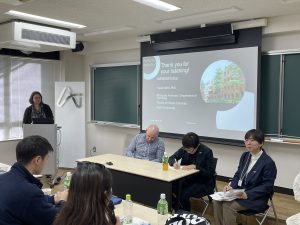
In the general discussion that followed, Dr. Yukari Ishii (Sophia University) first commented on the difficulty of accumulating histories of cross-dressing practices in bars and clubs, and the need to archive narratives that focus on the intersectionality of ethnicity and disability. She also pointed out that the preservation of narratives is an act of power that is done from a specific standpoint. In the discussion among the three speakers and floor participants, there was a lively exchange of views on how to overcome the difficulties that arise when researchers with different interests and fields collaborate with each other, and how to deal with the English-centric nature of archive creation and scholarly accumulation.
Overall, it was clear that while AI has the potential to make archiving more efficient, it also imposes limitations, such as the need to categorize narratives in a binary and categorical manner. It was also confirmed that AI is already being used in large-scale archives, but that ethical issues tend to take a back seat. Realistically, AI could be implemented in a way that researchers can control to some extent, such as using AI for tagging practices. However, as the terminology itself is updated, the difficulty remains in ensuring that the training data on which the AI is based reflects changes in the situation of the LGBTQ+ community. In any case, what seems to be needed is communication and collaboration between archivists, community members, and technologists. This study group brought together a variety of participants from across the community and disciplines involved in LGBTQ+ archives, resulting in a rich exchange and discussion that is a step toward collaboration. We hope that this colloquium will serve as a further impetus for the (digital) archiving of sexual minorities.
